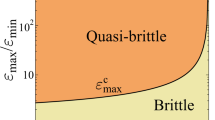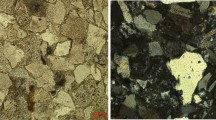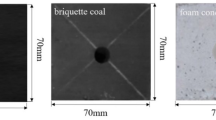Abstract
MICROSCOPIC examinations of fractures in materials have been restricted, in the past, to the detailed study of surfaces after failure has occurred; pre-failure development within the material has remained an elusive phenomenon. Thus the changes in structure which occur during stressing have usually been deduced from information obtained from a series of blocks each being subjected to different degrees of stress. While this approach can yield valuable information on the sequential changes in the internal structure of a material before failure, it lacks continuity, because it introduces both variations between samples and a degree of subjectivity in the interpretation of the sequence from the observed stages.
This is a preview of subscription content, access via your institution
Access options
Subscribe to this journal
Receive 51 print issues and online access
$199.00 per year
only $3.90 per issue
Buy this article
- Purchase on Springer Link
- Instant access to full article PDF
Prices may be subject to local taxes which are calculated during checkout
Similar content being viewed by others
References
Dinwoodie, J. M., Nature, 212, 525 (1966).
Kisser, J., and Steininger, A., Holz Roh- und Werkstoff, 10, 415 (1952).
Author information
Authors and Affiliations
Rights and permissions
About this article
Cite this article
DINWOODIE, J. Recording the Initiation and Development of Failure in Timber. Nature 216, 827–828 (1967). https://doi.org/10.1038/216827a0
Issue Date:
DOI: https://doi.org/10.1038/216827a0
This article is cited by
-
Einfluß der Reibung zwischen Prüfkörper und Druckplatten auf die Druckfestigkeit parallel zur Faser
Holz als Roh- und Werkstoff (1978)
Comments
By submitting a comment you agree to abide by our Terms and Community Guidelines. If you find something abusive or that does not comply with our terms or guidelines please flag it as inappropriate.



